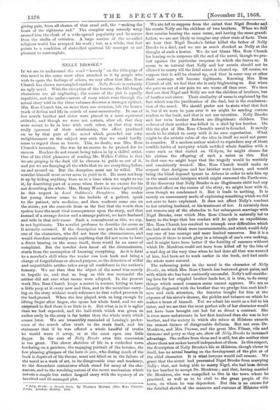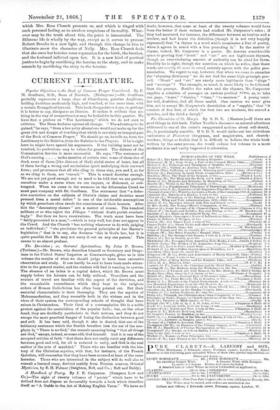NELLY BROOKE.*
IF we are to understand the word " homely" ou the title-page of this novel in the sense most often attached to it by people who wish to spare the feelings of others, we may allow that Mrs. Ross Church has shown unexampled candour. Nelly Brooke is certainly an ugly novel. With the exception of the heroine, the full-length characters are all unpleasing ; the course of the plot is equally repulsive, and the under-current of story which runs through the actual story told in the three volumes deserves a stronger epithet. Mrs. Ross Church has, on more than one occasion, left the beaten track of fiction and life in search of semi-monstrosity. In one of her novels brother and sister were placed in a most equivocal attitude, and though we were not certain, after all, that they were meant to be in love with each other, or that they were really ignorant of their relationship, the effect produced on us by that part of the novel which preceded our own enlightenment on the subject was such that we could hardly cease to regard them as lovers. This, no doubt, was Mrs. Ross Church's intention. She was by no means to be praised for its success. Readers do not resent being taken in by a skilful artist. One of the chief pleasures of reading Mr. Wilkie Collins is that we are groping in the dark till he chooses to guide us out of it, and yet we are fancying all the while that we see everything before us and around us. But the deception must not be wilful. The novelist himself must never seem to yield to it. He must not keep it up by hiding anything from us at a time when we ought to see it, by describing part of a scene when there is no excuse for his not describing the whole. Mrs. Henry Wood has sinned grievously in this respect in Lord (Mauna's Daughters. She makes her young doctor come to the bedside of a patient, speak to the patient, mix medicine, and then confront some one on the stairs; yet she conceals from us the fact that the words then spoken have the most vital consequences upon the story, and that instead of a strange doctor and a strange patient, we have husband and wife in that sick-room. Such a concealment as this, we say, is not legitimate. The novelist professes to describe the scene as it actually occurred. If the description was put in the mouth of one of the characters, who did not know the circumstances, and would therefore naturally omit anything that did not seem to have a direct bearing on the scene itself, there would be no cause of complaint. But the novelist does know all the circumstances, starts from the assumption of knowing everything. As it is fatal to a novelist's skill when the reader can look back and bring a charge of forgetfulness or altered purpose, so the detection of wilful and unjustifiable artifice takes away all confidence in the author's honesty. We see then that the object of the novel was merely to beguile us, and that so long as this was successful the author did not care what means were adopted. In the present work Mrs. Ross Church keeps a secret in reserve, letting us have a little peep at it every now and then, and in the meantime carry- ing on the story without much reference to that veiled presence in the background. When she has played with us long enough by lifting finger after finger, she opens her whole hand, and we are surprised to find there is so little in it. But what is in it is uglier than we had expected, and the half-truth which was given us rather early in the story is far better than the whole truth which comes later. We are irresistibly reminded of Lessing's prefer- ence of the search after truth to the truth itself, and his statement that if he was offered a whole handful of truths he would wave it away, or at the most open one little finger. In the case of Nelly Brooke even this concession is too great. The clever sketches of life in a cathedral town bordering on a gairison, the engaging portrait of the heroine, the few pleasing glimpses of the hero de jure, who during much of the book is deprived of his throne, must not blind us to the failure of the novel as a work of art, to its disagreeable tone and tendency, to the discordant caricatures which stand for many of the cha- racters, and to the revolting nature of the secret mechanism which invests a simple but rather languid story with the mystery of an involved and ill-managed plot.
• Nelly Brooke: a Homely Story. By Florence Marryat (Mrs. Ross Church). roles London: Bentley. 1868.
We are led to suppose from the outset that Nigel Brooke and his cousin Nelly are the children of two brothers. When we fuid first cousins bearing the same name, and having the same graict- father, we are not likely to imagine any other state of facts. Then we hear that Nigel Brooke's father killed the father of Nelly Brooke in a duel, and we are as much shocked as Nelly at the thought of such a horror. We do not blame Mrs. Ross Church for leaving us in suspense till the end of the novel, though we pro- test against the particular suspense in which she leaves us. It seems to us natural that Nelly and her cousin should not be allowed to marry till the fatal secret is cleared up. Of course, we suppose that it will be cleared up, and that in some way or other their marriage will become legitimate. Knowing Mrs. Ross Church of old, we feel that she is only frightening us. But when she puts us out of our pain we are worse off than ever. We then find out that•Nigel and Nelly are not the children of brothers, but of brother and sister. Their similarity of name is explained by the fact which was the justification of the duel, but is the condemna- tion of the novel. We should prefer not to state what that fact is, but if we were to pass over it we might be sending curious readers to the book, and that is not our intention. Nelly Brooke and her twin brother Robert are illegitimate children. The seducer of their mother was killed in a duel by her brother. On this the plot of Mrs. Ross Church's novel is founded. It merely needs to be stated to carry with it its own reprobation. 1Vhat might be the artistic value of the idea in itself we need not pause to consider. If a modern author wished to reproduce any of those terrible fables of antiquity which saddled whole families with a curse such as that visited on (Edipus, he might choose for his victims the offspring of such a union as this. But in that case we might hope that the tragedy would be worthily and consistently treated. Mrs. Ross Church would make us suspect that Antigone and her brother were lovers, and would bring the blind deposed tyrant to Athens in order to mix him up in the small social intrigues which might surround the Parthenon. If the discovery that Nelly Brooke is an illegitimate child had any practical effect on the course of the story, we might bear with it, even though we condemned it. But it leads to nothing. It is merely an unnecessary mode of explaining something which we did not care to have explained. It does not affect Nelly's conduct to her existing husband, or his treatment of her. It certainly does not remove any of the obstacles to her subsequent marriage with Nigel Brooke, over which Mrs. Ross Church is naturally led to hurry in the hope that her readers will be quite as expeditious. Mrs. Ross Church has resolved to triumph over difficulties which she had made us think were insurmountable, and which would defy any one of less courage and more limited resources. But it is a question if there is much glory in a triumph of one's own making, and it might have been better if the fertility of resource without which Dr. Monkton could not have been killed off by the bite of a mad dog at the very time when he had done all that was wanted of him, had been set to work earlier in the book, and had made the whole more natural.
The redeeming point in the novel is the character of Nelly Brooke, on which Mrs. Ross Church has bestowed great pains, and with which she has been eminently successful. Nelly's self-sacrific- ing love for her crippled brother leads her, it is true, to do many things which sound common sense cannot approve. We are so heartily disgusted with the brother that we grudge him such kind- ness and such attention, the luxuries bought for him at the expense of his sister's dresses, the pickles and tobacco on which he makes a beast of himself. Yet we admit his merit as a foil to his sister, and we see that the most perfect side of her character would not have been brought out but for so direct a contrast. She is even more unfortunate in her first husband than she was in her brother, and the society in which she mixes at Hilstone exceeds the utmost licence of disagreeable dullness. But not even Dr. Monkton, and Mrs. Prowse, and the great Mrs. Filmer, vile and tiresome and petty as they are, show off Nelly Brooke to increased advantage. She suffers from them and is still, but she neither rises above them nor makes herself independent of them. In this respect, the description of Nelly Brooke's life at Hilstone, though clever in itself, has no actual bearing on the development of the plot or of the chief character. It is what lawyers would call remote. We grant that the secret had prevented Nigel Brooke from marrying Nelly ; that, not being able to marry Nigel, she had bean driven by her brother to accept Dr. Monkton ; and that, having married Dr. Monkton, she was compelled to live in the town where he practised, as well as to be civil to the great people of the town, on whom he was dependent. But this is no excuse for the detailed sketch of the manners and customs of Hilstone with
which Mrs. Ross Church presents us, and which is tinged with such personal feeling as to awaken suspicions of its reality. What- ever may be the truth about this, the point is immaterial. The Hilatone life is wholly by the way, except as it serves to present Robert Brooke in a new light, and through this change in him to illustrate anew the character of Telly. Mrs. Ross Church feels that she owes her heroine some reparation for the birth, the brother, and the husband inflicted upon her. It is a new kind of poetical justice to begin by sacrificing the heroine to the story, and to make amends by sacrificing the story to the heroine.







































 Previous page
Previous page